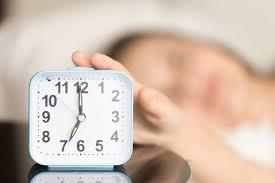Don't Push The Snooze Button
We should follow the alarm that is set, and get up at the time. If it is slightly difficult, you can set up multiple alarms in the initial mornings, but do not hit the snooze button while half asleep. That’s cheating.
If you have trouble sleeping due to sleep apnea or are showing signs of insomnia, do consult a sleep specialist.
217
1.71K reads
The idea is part of this collection:
Learn more about health with this collection
Strategies for promoting inclusivity
How to address unconscious bias
How to create a diverse and inclusive workplace
Related collections
Similar ideas to Don't Push The Snooze Button
Hitting the snooze button
No matter how tired you think you are when your alarm clock goes off, force yourself out of bed if you want to have a productive morning.
When you hit the snooze button and fall back asleep, you lose the alertness you'd get by respecting your sleep cycles and end up waking up later, ...
Using the snooze function
The optimal way to wake up is naturally. If someone is hitting the snooze button, it suggests they are not getting enough sleep or they are sleeping at the wrong time for them. If you are a habitual snooze button user, reset your alarm to the later time and get more consolidated sleep.
The importance of a consistent sleep schedule
Set yourself a time for bed and a wake time. Then stick to it. A consistent sleeping schedule allows you to predictably plan all the other things you intend to do.
- Don't hit the snooze button, but practice getting up immediately.
- Set aside the h...
Read & Learn
20x Faster
without
deepstash
with
deepstash
with
deepstash
Personalized microlearning
—
100+ Learning Journeys
—
Access to 200,000+ ideas
—
Access to the mobile app
—
Unlimited idea saving
—
—
Unlimited history
—
—
Unlimited listening to ideas
—
—
Downloading & offline access
—
—
Supercharge your mind with one idea per day
Enter your email and spend 1 minute every day to learn something new.
I agree to receive email updates
